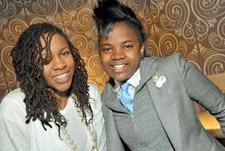“For us Swagger is about the attitude, having confidence in yourself and being able to go out there and represent yourself in a certain way.” As cofounder of the queer event production company Swagger, Laurence Alex Williams defines the meaning behind the company’s name. Along with c Tykkos (who likes the lowercase C), the two women are determined to deconstruct what people expect from queer events.
Swagga Like Us is the company’s premiere event launching during this year’s Pride in Toronto. Inspired by diverse US cultural events geared to queer people of colour, the expatriates from Trinidad wanted to bring that vibe to Toronto.
“With the Caribbean population or the Latino population there were a lot of parties geared specifically in those areas and we had never seen anything like that in Toronto,” says Tykkos about their travels to New York, Miami and LA. “We had been talking about this for probably years at this point but it was only in the last six months that we actually decided since no one else is doing it here then why aren’t we doing it.”
And who do they include when talking about “people of colour?”
“We’re including everyone who doesn’t consider themselves white,” says Tykkos. Adds Williams, “There are a lot of Asian people that come out to a lot of events. Tons of South Asians. There are definitely different people other than just black.”
Geared to women, Swagga Like Us will feature an all-female talent lineup that includes DJs Lissa Monét and Kalpmex as well as Kay-Ann Ward’s dance troupe Bollywood Burlesque with masti khor and Cutesy Callibre. There will also be surprise guest performances.
Williams and Tykkos intend to have urban music pumping out of the speakers, a sound that is not welcome at some other venues.
“There are certain clubs in Toronto that have said specifically that there are certain types of music that they refuse to play,” says Tykkos. “The music that I am talking about is soca and reggae. They say that it brings a specific type of clientele and that is not the clientele that they want to attract at their club — and this is exactly the type of clientele that we want to attract.
“This is the type of music that we listen to, what we grew up with and what’s indicative of our culture.”
Although Swagga Like Us may be calling out to a certain demographic, they have an open door policy for anybody who is willing to embrace the event.
“The event is diverse and we want everyone to be able to come but we are creating our events specifically for people of colour,” says Tykkos. “If white people want to attend then that’s amazing and that shows incredible solidarity and the fact that they are supporting us is excellent.”
Safety is also a big issue for patrons who have not always felt a sense of belonging in certain areas. “I think the location helps because it is in the west end,” says Williams. “A lot of people feel more comfortable coming out to a space like that instead of the downtown club district.”
“I think that we can honestly say that there are a lot of queer people of colour who specifically will not go to Church St because of various incidents that they’ve had there,” says Tykkos. “I’ve heard diverse stories… for some people it’s just a comfort level where they’ve been at clubs and they feel like they haven’t been welcome.”
“We also want people to come to an event where they see themselves represented and they are not going to be one of one.”
With so many Pride events taking place why would Swagga Like Us stand out? “Because we got the most swagger,” laughs Williams.
“I think it’s about attitude, swagger, and that we are trying to bring everyone together,” says Tykkos. “It’s the diversity.”

 Why you can trust Xtra
Why you can trust Xtra


